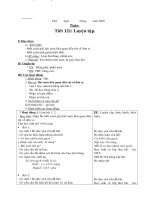- Trang chủ >>
- Lớp 6 >>
- Giáo dục công dân
ke hoach giang day 6
Bạn đang xem bản rút gọn của tài liệu. Xem và tải ngay bản đầy đủ của tài liệu tại đây (62.24 KB, 9 trang )
<span class='text_page_counter'>(1)</span><div class='page_container' data-page=1>
<b>I_ ĐẶC ĐIỂM TÌNH HÌNH CÁC LỚP DẠY :</b>
_: Phần n học sinh sống ở nơng thơn , kinh tế gia đình khó khăn , tiếp thu bài giảng
chậm, thiếu sự quan tâm gia đình , ý thức học tập kém,lười học .
_ : Phần lớn học sinh không có kiến thức cơ bản ở các lớp dưới . Học sinh yếu kém
chiếm khoảng 70%. Ý thức học tập quá kém so với năm cuối cấp ; điều này dẫn
đến việc tiếp thu bài chậm .
<b>II_ </b>THỐNG KÊ CHẤT LƯỢNG ĐẦU NĂM:
<b>LỚP</b> <b>SĨ SỐ</b>
<b>CHẤT LƯỢNG ĐẦU NĂM</b> <b>CHỈ TIÊU PHẤN ĐẤU</b>
<b>GHI CHÚ</b>
<b>TB KHÁ GIỎI</b>
<b>Học kỳ I</b> <b>Học kỳ II</b>
<b>TB KH</b>
<b>Á</b>
<b>GIỎ</b>
<b>I</b>
<b>TB KHÁ GIỎI</b>
<b>III_ BIỆN PHÁP NÂNG CAO CHẤT LƯỢNG:</b>
_ Hướng dẫn cho học sinh phương pháp học tập hợp lý.
_ Tổ chức học sinh học tổ , nhóm . Thường xuyên kiểm tra bài cũ
.
_ Tổ chức dạy phụ đạo cho học sinh yếu kém .
<b> IV_ </b>KẾT QUẢ THỰC HIỆN:
<b>LỚP</b> <b>SĨ SỐ</b> <b>Sơ kết học kỳ I</b>
<b>Tổng kết cả năm</b> <b><sub>GHI CHÚ</sub></b>
</div>
<span class='text_page_counter'>(2)</span><div class='page_container' data-page=2>
<b>V</b>_ <b>NHẬN XÉT , RÚT KINH NGHIỆM:</b>
1-Cuối học kỳ I:
………
………
………
………
………
………
Cuối năm học :
</div>
<span class='text_page_counter'>(3)</span><div class='page_container' data-page=3>
Tên
chương
TS
tiế
t
Mục đích ,
yêu cầu
Kiến thức cơ
bản
Phương pháp
giảng dạy
Chuẩn bị
của thầy
và trò
Ghi
chú
<b>1 </b>
<b> </b>
<b>GR</b>
<b>EE</b>
<b>TI</b>
<b>NG</b>
<b>S</b>
<b>5</b>
_greet
people
_identify
oneself
_ask how
people are
_say
goodbye
_introduce
oneself and
others
_say how
old one is
_say how
old others
are
_count to
twenty
_present
simple of <b>be</b>
_WH-questions
with
<b>How , How</b>
<b>old</b>
communicative
approach
</div>
<span class='text_page_counter'>(4)</span><div class='page_container' data-page=4>
<b>2 </b>
<b> A</b>
<b>T </b>
<b>SC</b>
<b>HO</b>
<b>OL</b>
<b>5</b>
_give and
obey others
_ask for and
give
personal
information
_identify
oneself and
others
_identify
places,
people ,
objects
_imperative
_present
simple of the
ordinary
verbs
_That /This
is…
_possessive
adj.
_indefinite
art.
communicative
approach
_pictures
_exercises
_hand-out
_chart
_stereo
_realia
<b>3 </b>
<b> A</b>
<b>T </b>
<b> H</b>
<b>OM</b>
<b>E</b>
<b>5</b>
_identify
places and
objects
_give
personal
information
_identify
people
_ask for and
give
numbers
_describe
the family
_How many
_There is/are
_What is
this/that?
_personal
pronoun
communicative
approach
</div>
<span class='text_page_counter'>(5)</span><div class='page_container' data-page=5>
<b>4 </b>
<b> B</b>
<b>IG</b>
<b> O</b>
<b>R </b>
<b>SM</b>
<b>AL</b>
<b>L?</b>
<b> </b>
<b> </b>
<b> </b>
<b>5</b>
_describe
location and
size of
school and
of objects
_identify
possession
_describe
everyday
activities
_ask for and
say the time
_spell words
_adjectives
_possessive
case
_present
simple of
<b>have</b>
_What time
…?
_How
many….?
communicative
approach
_pictures
_exercises
_hand-out
_chart
_stereo
<b>5 </b>
<b> T</b>
<b>HI</b>
<b>NG</b>
<b>S </b>
<b>I D</b>
<b>O</b>
<b>5</b>
_describe
everyday
routines
_ask for and
say the time
_describe
school
time-tables
_adverbs of
time
_present
simple tense
_yes-no
questions
_prepositions
: at <sub>communicative</sub>
approach
</div>
<span class='text_page_counter'>(6)</span><div class='page_container' data-page=6>
<b>6 </b>
<b> P</b>
<b>LA</b>
<b>CE</b>
<b>S</b> <b>5</b>
_give
personal
details
_describe
places
_describe
locations
_describe
surroundings
_prepositions
of position
_Where ,
Which ,
What
_adjectives communicative
approach
_pictures
_hand-out
_chart
_stereo
<b>7 </b>
<b> Y</b>
<b>OU</b>
<b>R </b>
<b>HO</b>
<b>US</b>
<b>E</b>
<b>5</b>
_describe
objects
_identify
places and
layouts
_describe
everyday
activities
_talk about
habitual
actions
_adverbial
phrase
_WH-questions
_There is/are
_yes-no
questions
communicative
approach
</div>
<span class='text_page_counter'>(7)</span><div class='page_container' data-page=7>
<b> </b>
<b> 8</b>
<b> </b>
<b> O</b>
<b>UT</b>
<b> A</b>
<b>ND</b>
<b> A</b>
<b>BO</b>
<b>UT</b>
<b>5</b>
_ describe
activities
_ identify
means of
transportation
_ identify
road signs
_ describe
on-going
activities
_present
continuous
_can , can’t
_ must ,
mustn’t communicative
approach
_pictures
_hand-out
_chart
_stereo
<b> </b>
<b> 9</b>
<b> </b>
<b> </b>
<b> </b>
<b>TH</b>
<b>E </b>
<b>BO</b>
<b>DY</b> <b>5</b>
_ identify
parts of the
body
_physical
descriptions
of people
_ identify and
describe
facial features
_adjectives
_
WH-questions
_ be + adj
communicative
approach
_pictures
_hand-out
_chart
_stereo
<b>I0</b>
<b> S</b>
<b>TA</b>
<b>YI</b>
<b>NG</b>
<b>HE</b>
<b>AL</b>
<b>TH</b>
<b>Y</b>
<b>6</b>
_talk about
feelings
_ talk about
wants and
needs
_ identify
food and
drink
_express
possession
_WH-questions
_Is / Are
there …?
_polite
request
_ some , any
</div>
<span class='text_page_counter'>(8)</span><div class='page_container' data-page=8>
<b>15</b>
<b> C</b>
<b>OU</b>
<b>NT</b>
<b>RI</b>
<b>ES</b>
<b>7</b>
_talk about
countries,
nationalities
and
languages
_ describe
places
_state
dimensions
_makes
comparisons
_ describe
natural
features
_ WH-
questions
_comparatives
of adj
and
superlatives.
_ present
simple
communicative
approach
_maps of
the world
_pictures
_diagram
_hand-out
<b>16</b>
<b> M</b>
<b>AN</b>
<b> A</b>
<b>ND</b>
<b> </b>
<b> </b>
<b> </b>
<b>TH</b>
<b>E</b>
<b> </b>
<b> E</b>
<b>NV</b>
<b>IR</b>
<b>ON</b>
<b>M</b>
<b>EN</b>
<b>T</b>
<b>5</b>
_ identify
quantities of
food
_talk about
environmental
issues
_ talk about
occupations
_a few /
little ,
</div>
<span class='text_page_counter'>(9)</span><div class='page_container' data-page=9></div>
<!--links-->









